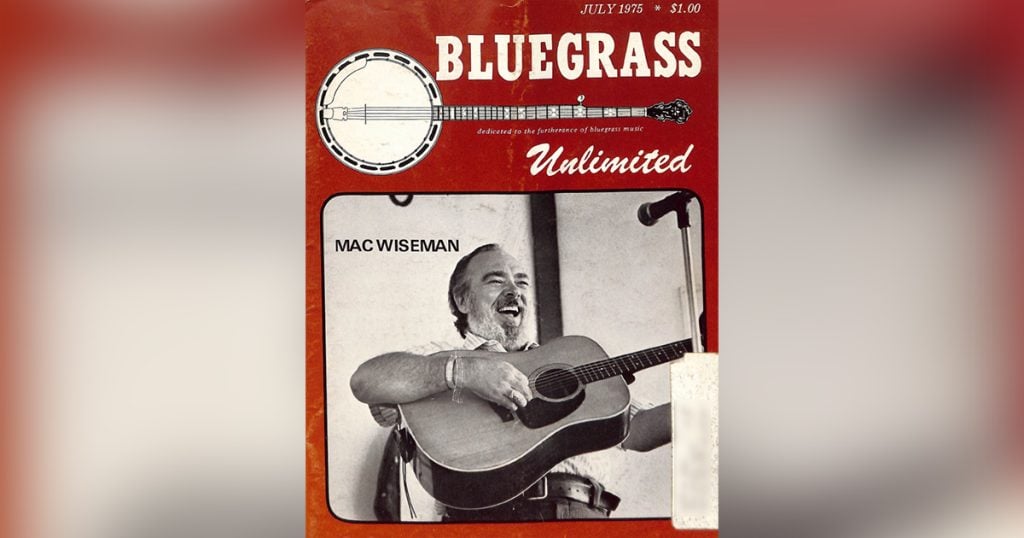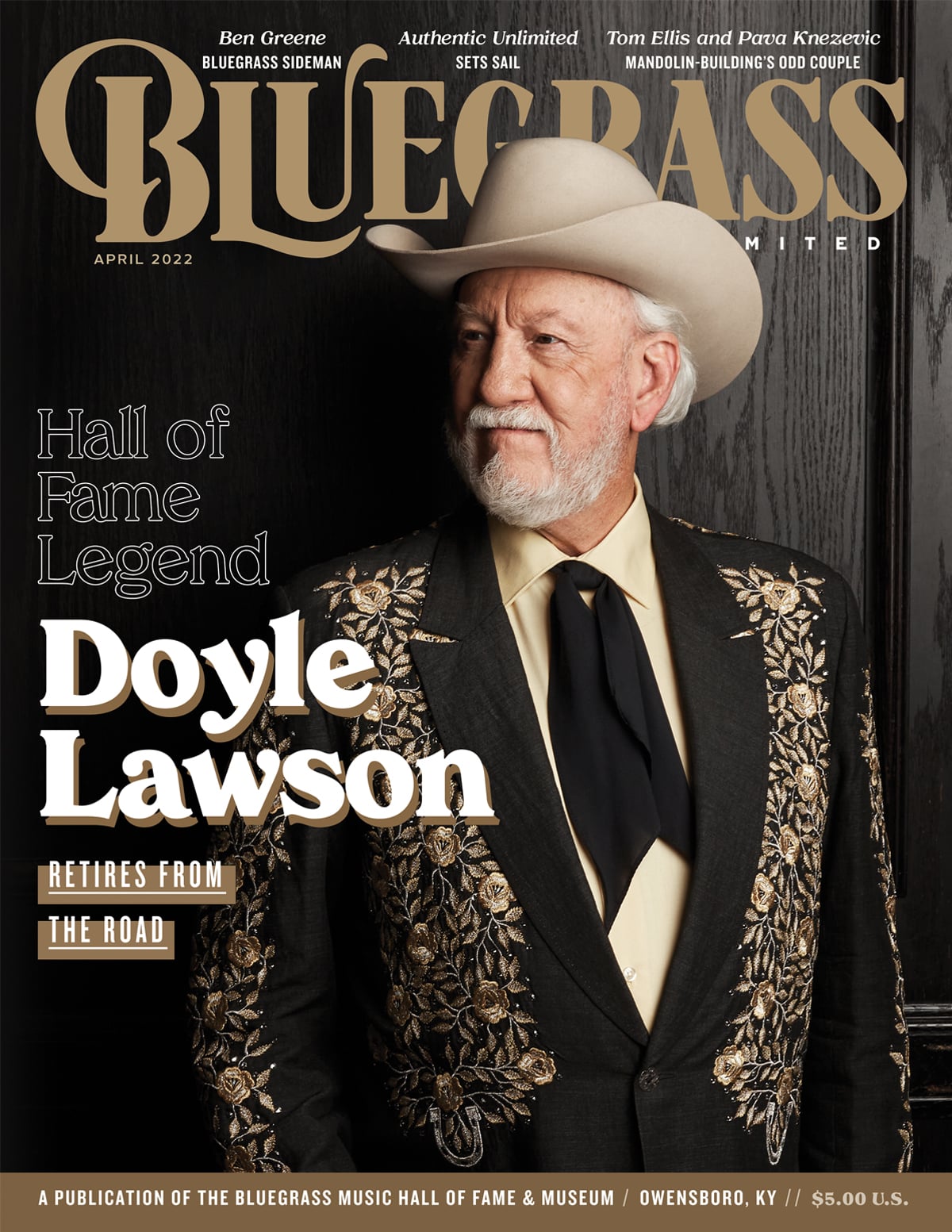Home > Articles > The Archives > Mac Wiseman
Mac Wiseman
Reprinted from Bluegrass Unlimited Magazine
July 1975, Volume 10, Number 1
The grassy pasture land an hour’s drive above Augusta, Georgia, had turned into a field of wet grass and mud due to the heavy rains which had drenched the bluegrass music fans several hours earlier. Finally, the heavy rain had subsided to a mild drizzle, and the Masters Bluegrass Festival was once again underway after being delayed due to electrical problems.
Originally, the festival was planned for a former stock car race track in Augusta (hence the name Masters Bluegrass Festival after the famous golf tournament held annually in the eastern Georgia city), but a change in plans resulted in the site being moved to the pasture land.
Ed Hurt, promoter of the festival, (also known for his annual master of ceremonies work at the Union Grove, North Carolina, Old-Time Fiddler’s Convention) was just jinxed all around. The idea of a festival in the area was good, because a successful bluegrass festival had been held in the Augusta area the previous year. So, it happened Ed Hurt decided to take up the bluegrass ball and stage a local event. He hired Mac Wiseman (fresh from a historic and monumental success in England), the fine team of Don Reno and Bill Harrell and the “World Champion” group L.W. Lambert and the Blue River Boys. To top it off, Hurt advertised a $1,500 talent contest (“no electrical instruments permitted”) to attract some good local musicians and singers.
Musically, Hurt’s festival was a success. Financially, it was a bomb. One big reason was the fact the festival was scheduled on one of Augusta’s most active youth weekends, with the Third Annual Great Savannah River Raft Race being held on the Sunday of the two day bluegrass festival.
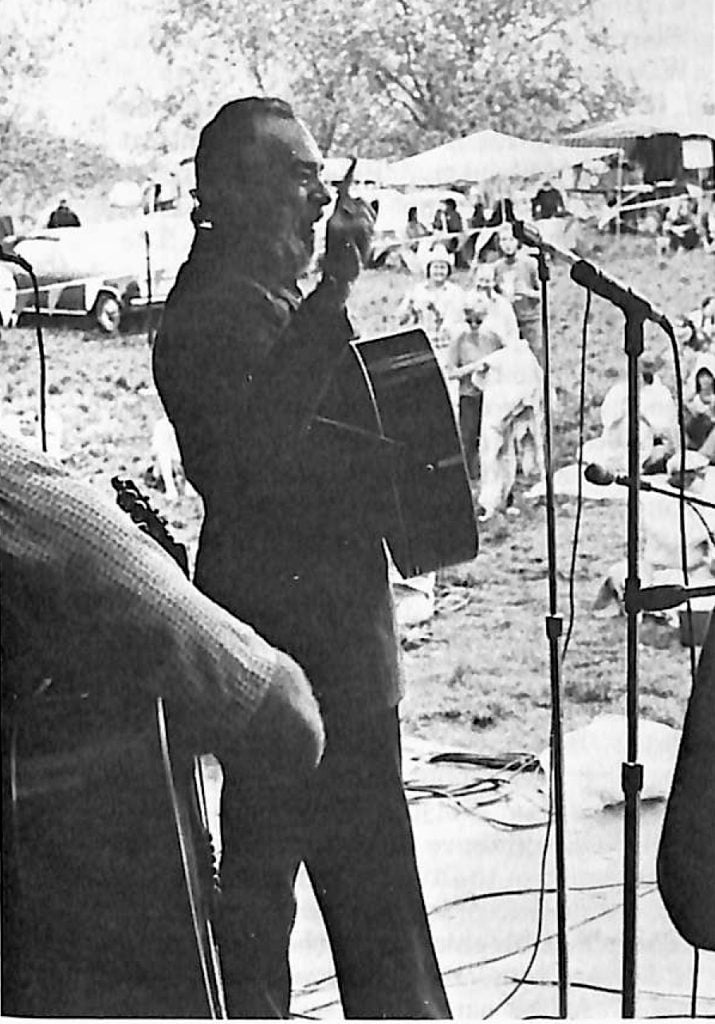
The site of the festival itself a few years earlier had been a musical venture that ended in disaster. Earlier, the developed area had been known as Country and Western World. The stage with its nightclub type run-way reaching into the audience, the huge covered shed for spectators, the parking area and a nearby lake were all created during the short life of the country music park.
Hundreds of local citizens paid good money for season passes to the country music park, whose developers promised great things. As it turned out, the stage now being used for the bluegrass entertainers at Hurt’s festival, saw the likes of such country music celebrities as Hank Snow, Jeannie Pruett, Bob Luman, Tompall and the Glaser Brothers, David Houston, Kenny Price, Jerry Foster, Nat Stuckey and even Lester Flatt. But the great things promised failed to happen. The developer tried too much too soon, and the park went bankrupt. For several years, the stage and audience protection shed fell prey to vandals until Hurt came along and chose the place for his festival.
Thus, it came to be bluegrass musician and singer Mac Wiseman found himself standing on the stage in the middle of the huge pasture as the drizzle continued to force the loyal fans to seek shelter under the covered shed about 25 yards away.
For Mac Wiseman, the stage was thousands of miles away from the scene of one of the greatest triumphs of his career, which had occurred only a few weeks earlier. Instead of the some 700 fans huddled under the outdoor shed, Wiseman earlier had appeared before some 20,000 fans gathered in-doors at Wembly Hall in London. But no matter the place—no matter the size of the crowd—Wiseman always puts on a good show if he is playing to an enthusiastic and appreciative audience.
The rain did not discourage him on the Georgia stage. Lord knows Wiseman had seen rain plenty of times before at other festivals. He told the audience after his first number, “I’ve got a deal with the farmers around here, but this is ridiculous!”
Dressed in maroon pants and shirt and darker red sports coat, Wiseman on his first set sang “Wabash Cannonball”, “I Wonder How The Old Folks Are At Home” (which he always introduces by adding, “I used to wonder until I woke up one morning and I was one”), “Me and Bobby McGee”, “Footprints in the Snow”, “Shackles and Chains”, “Eight More Miles To Louisville” and closed with “Will The Circle Be Unbroken”.
By the end of his closing number, Wiseman had the damp crowd coming alive, and joining with spirit in the chorus of the song which has become a bluegrass festival standard. Mother Maybelle Carter and Jimmy Martin would have been right proud. He left the stage to cheers and applause. Later at night, Wiseman was destined to return to the stage and would proceed to tear the crowd up.
Once through with the first set, however, Mac began a short journey to the motor home owned and used by Don Reno and Bill Harrell. Wiseman was stopped several times on the way by fans wanting autographs and pictures taken with the star. He obliged all who asked, while at the same time squishing his way through the mud to the motor home.
Reno, along with about four other persons already inside the motor home, greeted Wiseman and began talking about concert dates, people they knew, funny and semi-funny stories, and other routine on-the-road chatter. Harrell was asleep during this time on a bunk in the rear of the van. Dr. Ken Smith—a dermatologist from Anderson, South Carolina and one of the biggest bluegrass fans around – he even plays bluegrass music instead of Muzak in his waiting room—brought Wiseman something to wet his whistle, as Mac found a vacant seat.
Once settled, Wiseman began another interview, with the first topic of discussion being the rapidly growing popularity of bluegrass music in Europe. Since he had just returned from a highly successful series of shows in England, Holland and Belgium, Mac was a good spokesman for the bluegrass music scene overseas. It should be noted, at this point, Bill Monroe had only a few weeks prior to the Wiseman interview, returned from a tour of Japan which also confirmed the growing world-wide popularity of bluegrass and old-time country music.
“This world-wide thing for bluegrass music is mushrooming,” Wiseman said. “People over there are not only aware of the old songs, but they’re interested in knowing everything they can about them. It’s a real healthy attitude being shown. They’re especially interested in knowing the lyrics to the songs, and song books are in big demand. The bluegrass music scene in Europe is the same now as it was in the United States thirty years ago when I first entered this business.”
Wiseman’s popularity in Europe extends back into the mid-1950’s. “Back in the ’50’s, I first became known in the United States when my early recordings were released. Then, in the early 1960’s I experienced a resurgence of popularity with the hootenanny folk music craze. Finally, today, I seem to be doing okay because of the popularity of bluegrass festivals,” Wiseman related. “It was during the 1950’s my recordings began to sell in Europe. My version of “Wabash Cannonball” was the first bluegrass record released in England, and that was in the mid-1950s. Also, in the 1950’s, my records rated in the Top 10 in England for three consecutive years.
When I was performing in England on this last trip, a collector from Sweden came up and showed me fourteen of my albums he had. He wanted me to autograph them all, and told me he paid up to fifteen dollars each for some of the albums. I also learned on this last trip my first album, “Tis Sweet To Be Remembered”, which was released in the United States in 1956, is now selling for one-hundred dollars a copy in England and Ireland. Dr. Smith (the Anderson, South Carolina dermatologist) paid seventeen dollars for the same album at an auction in America recently, “Wiseman noted with a touch of pride in his voice.
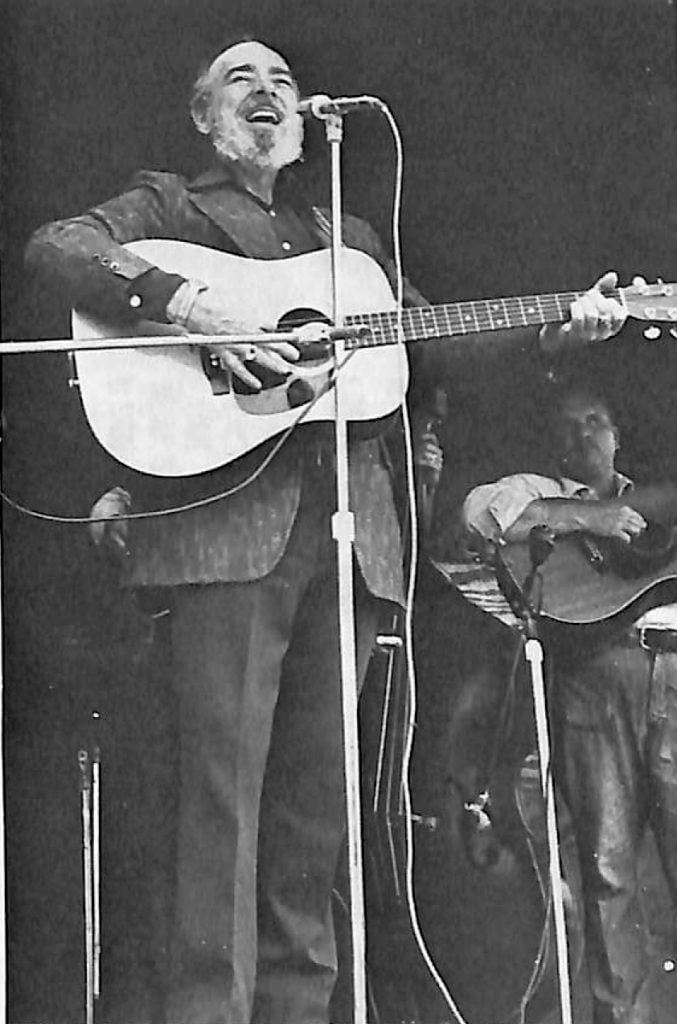
In 1974, both Wiseman and Bill Monroe were the only two bluegrass music artists on the annual international country music spectacular held in Wembly Hall in London. Through the grapevine of other entertainers who had been on that trip and the stories that emerged in the press at the time, Wiseman and Monroe stole the show. This past March, Wiseman was the only bluegrass artist on the bill, and he again received the acclaim of both fans and critics.
British reporter Colin Chandler, writing in the May issue of Nashville’s Music City News publication, states “The average British country music fan is a special breed wanting to hear mainly down home country music only. No pop, no rock and no cross-over artists—just plain country which probably explains why some artists are accepted here (England) more than others.”
Chandler further reports Mac Wiseman received a “tremendous ovation” and says Wiseman is “an old favorite of everyone in Britain.”
“The first time I went to Wembly was about five years ago as a director on the board of the Country Music Association. We had an annual meeting there,” Wiseman recalls. “Then, for the past three years, I have gone to the festival as a performer.”
Wiseman reports the annual event (just completing its seventh year) is booked by promoter Mervyn Conn. “The show is held on Saturday and Sunday nights of Easter weekend with different casts. This year both shows were sold out with in excess of twenty-five-thousand people. Since many people saw both shows, it is estimated the crowd on each night was around twenty-thousand. The top cost of the best seats in the hall would be equivalent to our twenty dollars. In 1974 there were about ninety entertainers including sidemen, who went on one plane. A lady in Nashville handles the transportation arrangements.
“We leave Nashville on Thursday about 1 pm or 2 pm and take a jet to New York, and from there catch a charter flight to England. We leave New York about 7 or 8 in the evening, and with the time change of five hours and the flight time of about six hours, we arrive in London about 7 or 8 Friday morning. We are met by limousines and buses, and are taken to our hotel, where we check in and get a few hours sleep to make up for the jet lag. But, because it is about midnight back in the states, it is always hard to sleep.
“Friday afternoon, we attend a cocktail party where we have cast pictures taken and meet the press. Then we attend a catered dinner where all the entertainers generally get up and sing a song or two. Besides the European press, the American press is also represented with reporters from Billboard, Cashbox and other publications. It has become the fact whatever happens on this London show is closely watched by European promoters. The Wembly show has become like the Broadway of the British Isles. It’s a showcase for talent. You only go on once, and do a few numbers.”
Wiseman said he was the next to closing act on Saturday night, the most prestigious day of the festival, with Dolly Parton closing the Saturday night portion. He reported he opened with “Wabash Cannonball”, just as he did a short time earlier on his first set for Hurt’s festival. Then, he went into “Me and Bobby McGee”, “Jimmy Brown, the Newsboy”, “Mama, Put My Little Shoes Away”, “Catfish John” and closed with “Keep On The Sunny Side”.
“The second level of Wembly Hall is set up like an arcade, with various hawkers and sellers with booths. RCA Records had brought my first RCA album released in the States (“Johnny’s Cash and Charley’s Pride”) to the arcade because it had not been released in England. At the same time on another end of the arcade, Anchor Records, representing ABC/Dunhill and Dot, whom I had recorded for in the 1950’s, released a collection of my old recordings. On Saturday afternoon, the ABC people came and got me and I autographed albums for forty-five minutes as fast as I could sign my name. They ran out of albums, and people were still lined up. Then, I went across the walkway to the RCA booth and I signed albums for one hour and fifteen minutes. RCA sold three-hundred copies in that time, and they had to shut the booth because the show was starting for Saturday night. In all, that was two hours of straight writing not signing ‘Best Wishes’ or ‘Sincerely Yours’, but just writing ‘Mac Wiseman’ ”.
After the Wembly festival, Wiseman was booked for five consecutive nights at clubs in Holland and Belgium. He notes these dates were not on military bases, but in nightclubs in the various cities. The promoter who had booked the dates, also had brought a bus load of fans to the Wembly festival, and he asked Wiseman if he would like to ride back on the bus with the tour group. Wiseman took the promoter up on the offer because he thought it would be a great way to see Europe. Needless to say, the fans on the bus who had just seen Wiseman in concert were in awe.
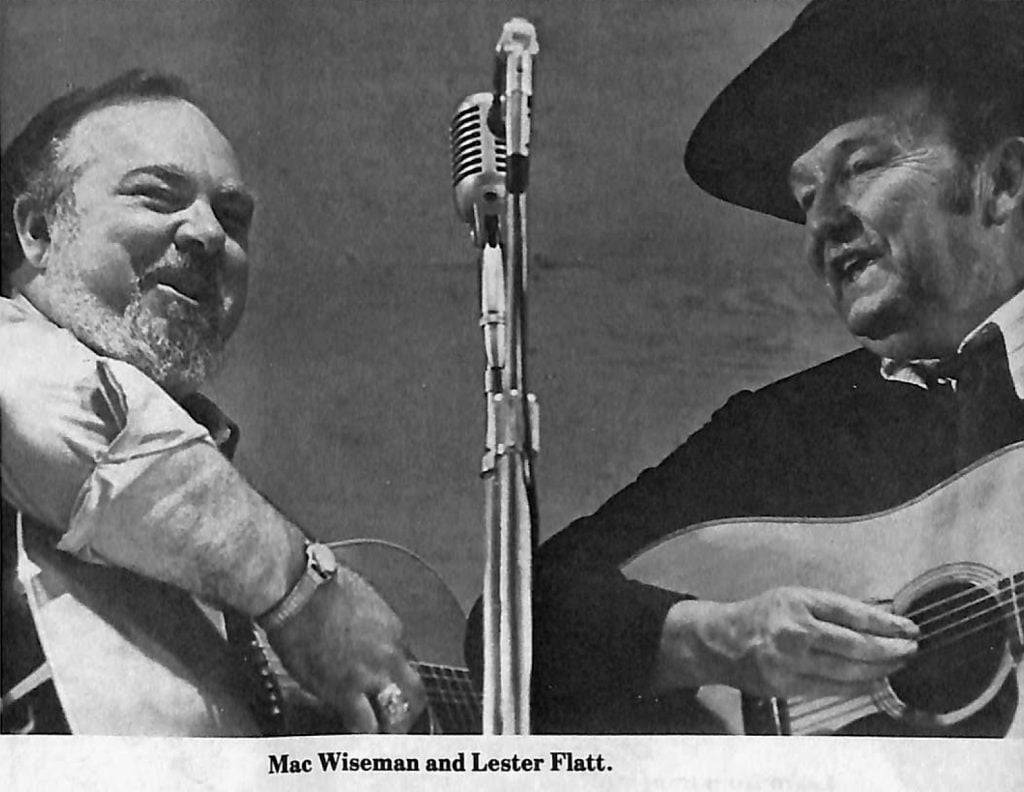
Wiseman admitted he was awed on the bus trip, too, but by the sights he experienced first hand. “I was flabbergasted on seeing the white cliffs of Dover. It is such a beautiful and historic spot. I remember the place being mentioned in Winston Churchill’s great speeches, and there was a song about it by Kate Smith in the 1940’s.” At this point in his narration, Wiseman began singing, “There’ll be bluebirds over the white cliffs of Dover, tomorrow, just you wait and see…” As he sang there was a definite sparkle in his eyes. “The cliffs really take your breath away,” he said. “But what really knocks you out is right at the foot of this beautiful and historic place, they have a first class Holiday Inn!”
On his series of one-nighters in Belgium and Holland where he received standing ovations, Wiseman would perform about 45 minutes just with his acoustic guitar, and then would call out a band of Dutch musicians for four or five numbers. “The first couple of nights I did “Catfish John” and didn’t get much of a response with the song. Then, someone told me the song didn’t mean a hell of a lot to them, because in Europe they do not have any catfish. They thought catfish was a piece of rough fish you threw away to a cat. So, on the other shows, I began a monologue explaining what a catfish is in America, and explaining the rest of the song. Once, the audience learned this, it made a world of difference.”
Something that really impressed Mac was the attentiveness the audience gave the performer in the clubs. “When it came time for the show, the bartender would serve no more drinks and would tell the audience to be seated. When I did participation numbers like “Keep On The Sunny Side” and “Will The Circle Be Unbroken”, the audience would join in, but not until you asked for them to join in.”
In April, Wiseman, returned to London for a show at the London Palladium concert hall with country music star Bill Anderson. “The Palladium is the equivalent to our Carnegie Hall,” explains Wiseman. I did the first half of the show, and Bill Anderson did the second half. The response we got was very, very good.”
“You cannot put into words the feeling you get when you go to a foreign country and the people know your old songs,” Wiseman said. “I practically had to hold a gun to my booking agents’ head to get him to book me in Europe. But, I wanted to feel this market out, and I think it paid off. Due to the success of my recent trip, I’m planning to return in October for concerts in Switzerland, Germany, Holland, Sweden and Belgium.”
When Wiseman returned to the United States from his European tour, he brought back about ten pounds of Gouda cheese. “I’m a lover of good cheese, and so while I was in Europe I bought ten pounds at $1 a pound. I declared it at the airport, but I guess the inspectors didn’t believe me. It cost me $10 per pound in excess baggage to bring the cheese over, so I ended up paying $100 for $10 worth of cheese. Also, I got 25 varieties of the most beautiful lillies you’ve ever seen in your life and that excess baggage also cost me $10 a pound.”
When Wiseman sings, his voice is unique. Probably the only previously recorded artist Wiseman’s voice can be compared to is of a Texas-born singer named Vernon Dalhart. Their singing styles are a lot alike. Dalhart has the distinction of being the first country artist to have a record that sold over a million copies. The record was Dalhart’s recording of “The Prisoner’s Song” (“If I had the wings of an angel, over these prison walls I would fly….”). But, when Wiseman discusses the greatest influence on his style, he speaks of one of the first women to lead a country band, Molly O’Day—who still is considered as one of the greatest all-time country music performers.
Wiseman was with a band called “The Hungry Five” when he gained the attention of Molly O’Day. “I travelled with her eight or nine months in late 1946 and early 1947, being the featured singer and bass player with her show. She was the first major artist I traveled with, and she was definitely one of the first big breaks I had. I was with the other groups later, but they did not influence me as much as she did. Her authenticity and her mountain style of singing was the biggest influence on my own style. She was so real. When I left her, I still included many of her songs in my repertoire.
“It’s very ironic, though. Although she is the person who had the most influence on my life, I haven’t seen her in thirty years, but if she walked in today, I’d kneel at her feet. We’ve crossed paths many times, but never on the same day. I played bass on her first recordings for Columbia. It seems strange, now, but there were no major studios then in Nashville, so we went to Chicago where she recorded sixteen sides on Thanksgiving Day, 1946. Most of those numbers were Hank Williams’ first recorded songs such as “When God Comes and Gathers His Jewels”, and “Six More Miles (To The Graveyard)”.
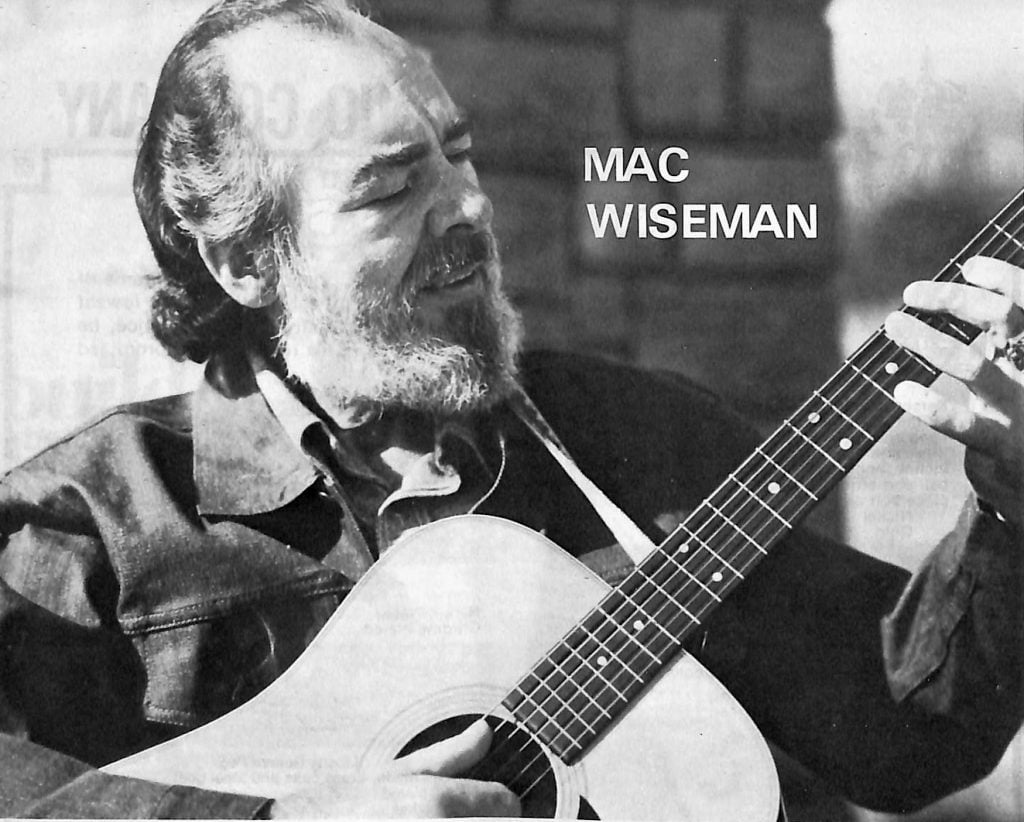
The mention of Hank Williams brings Wiseman talking about the contribution Molly O’Day had on Williams’ career. “Molly, without a doubt, was the female Hank Williams of all time,” relates Wiseman. “She had that special earthy delivery Williams had. I have the firm conviction if not for Molly O’Day, there would have been little known of Hank Williams. Fred Rose, of Acuff-Rose song publishers, recognized Molly’s singing ability in Knoxville, and shortly afterwards, he recognized the songwriting ability of Hank Williams. It was Rose who brought these two people together, by having Molly become the first major artist to record Hank’s songs. That was three years before Hank became a big star on the Grand Ole Opry. I was on the Opry in 1949 when Hank sang “Lovesick Blues” and became a hit on his first Opry appearance. But, I had recorded some of Hank’s songs with Molly O’Day more than three years before his Opry debut.”
Wiseman recalls he left Molly in the Spring of 1947 and went to Bristol, Virginia. It was in Bristol in 1948 Wiseman joined up with a group Lester Flatt had helped to form after he and Earl Scruggs left Bill Monroe. The group performed daily on a two hour radio show called “Farm and Fun Time”. Within two weeks of the first broadcast, the band which became the Foggy Mountain Boys, was booked solid for three months in advance. Wiseman had been given the booking responsibilities.
In the fall of 1970, Wiseman and Flatt met at a bluegrass festival in Myrtle Beach, South Carolina, and talked about teaming up for an album that would recapture the musical mood and spirit of that period in the late 40’s. On March 15, 16 and 17, in 1971, Flatt and Wiseman entered the RCA studio in Nashville and ended with the “Lester N’ Mac” album as the result. The album was so successful, the duo did two more such albums: “Over The Hills To The Poorhouse” and “On The Southbound”.
Wiseman observed of his time with Lester and Earl, “This is the first I’ve really been aware of it, the extra guitar licks I developed were when I was working with Lester. You see, I was at liberty to experiment and try new things, because Lester was carrying rhythm, Cedric Rainwater (Howard Watts) was playing exceptionally strong bass, and Earl Scruggs was playing a tremendous rhythm banjo when he dropped down to rhythm, so really I was on the side of the stage there, just goofin’ around, so to speak.”
In January, 1949, Wiseman left Flatt and Scruggs’ group and went to work with WSB radio in Atlanta, Georgia, “in the last throes of the WSB Barndance show.” He continues, “When that folded in early 1949, I called Bill Monroe and asked him for a job. At Easter of 1949, I joined Bill at the Grand Ole Opry and was with him until Christmas of that year. That’s when I went back to Bristol.”
About this time in our conversation Bill Harrell came up and began talking with Wiseman about Mac’s upcoming annual Renfro Valley Bluegrass Festival which he has staged in Kentucky since 1971. Also, Harrell and Wiseman discussed the major surgery Wiseman had in early 1974, which resulted in Wiseman changing from resembling Johnny Russell to resembling Pete Seeger. In the short time of 10 months, Wiseman lost one-hundred and fifty-five pounds. He noted of the serious operation, “Lester Flatt had a song all picked out for my funeral, but I ruined his act and got well.”
Inevitably-and unfortunately-the interview ended. When I left, Wiseman and Harrell were still swapping stories, telling jokes, talking about concert dates and asking where they could get a bite to eat.
